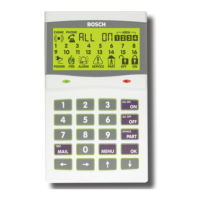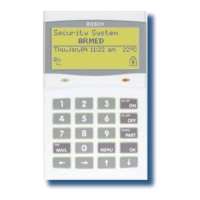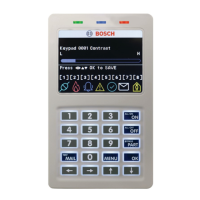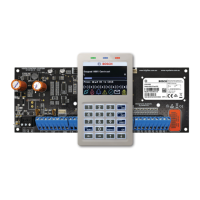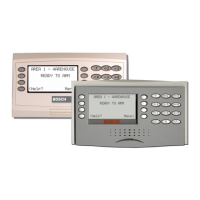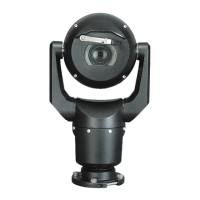Do you have a question about the Bosch Solution 16i and is the answer not in the manual?
Legal notice regarding the copyright of this publication.
Statement on the use of trademark names in the document.
Disclaimer regarding the accuracy and use of information.
Information regarding Telecom acceptance of device operation.
The control panel provides up to 16 separate zones of protection.
The control panel supports up to 4 separate areas.
The control panel has a built-in dialler to send reports.
You can connect a maximum of 8 fully supervised keypads.
The control panel can store up to 256 history events.
You can program the panel via keypad or PC software.
Details on MW700 Small and MW710 Large enclosures, including tamper bracket and mounting.
Instructions for fixing CM700B Small and CM710B Large enclosures to surfaces.
Step-by-step guide on how to install the tamper switch in the enclosure.
Information on module spaces within MW700 and MW710 enclosures and module mounting.
Instructions for connecting AC and DC power sources to the panel.
Instructions for connecting the system's battery.
Explains the meaning of the Dialler and Status LED indicators on the PCB.
Explains resistor colors and values for EOL configurations.
Describes the RS485 LAN communication for system modules.
Details the recommended module connection diagrams for LAN wiring.
Guidelines for connecting the system to earth ground.
Explains the correct termination of the system LAN for reliable operation.
Lists and describes the function of various board connectors.
Describes the function of each button on the ICON keypad.
Guide to setting unique addresses for each keypad connected to the panel.
Explains key sequences to trigger emergency alarms from the keypad.
Explains the meaning of icons and LEDs on the keypad display.
Describes the different tones emitted by keypads for system events.
Explains how to use DTMF control for managing areas and outputs remotely.
Details the CM704B module for expanding zones and its features.
Instructions on setting addresses for LAN modules like CM704B, CM720B, CM710B.
Introduction to the ICON system's programming interface and methods.
Explains the meaning of text characters and abbreviations displayed on the keypad.
Describes the structure of programming menus and location numbers.
Details how to program option bit locations and their parameters.
How to program names for areas, zones, users, etc.
Guide to programming primary and secondary telephone numbers for the system.
How to program list options for zones, users, areas, keypads, etc.
Instructions for setting the system date and time.
Explains how to activate and use service mode for system testing and maintenance.
Instructions for performing hardware and software default resets of the system.
Lists changes applied when selecting domestic default settings.
Instructions for programming the panel using Solution Link software.
Provides a reference for reporting codes used by the system.
Commands related to system status and control.
Settings for the system's date and time.
Configuration of various system timers.
Settings related to power management.
Configuration options for the system siren.
Settings for system schedules.
Configuration for holiday periods affecting system operation.
General configuration options for the system.
Table showing default programming options for users 1 to 48.
Commands related to access control.
Configuration and management of PIN codes.
Configuration and management of access tokens.
Configuration and management of RF keyfobs.
Global configuration settings for access control.
Configuration settings for proximity readers.
Settings for programming different areas within the system.
Configuration properties for system areas.
Configuration of reporting destinations and routes for areas.
Procedures and settings for testing system areas.
Configuration settings for system zones.
Programming the names for individual zones.
Selecting the type of detection for each zone.
Assigning zones to specific system areas.
Configuring pulse counting for zones.
Setting the time duration for zone pulse counts.
Assigning zones to access groups.
Configuring the reporting route for zone events.
Setting options for zone event reporting.
Configuring specific options for zones.
Global configuration settings for inputs.
Configuration for Programmable General Output inputs.
Configuration and testing for RF zones.
Lists default values for all zone parameters.
Configuration options for global inputs.
Configuration options for tamper detection.
Commands for controlling output status.
Configuration properties for outputs.
Procedures for testing system inputs.
Setting the time for sensor watch monitoring.
Lists and describes available output event types.
Defines polarity settings for outputs.
Configures timing parameters for outputs.
Explains the operation of one-shot output modes.
Explains the operation of pulsing output modes.
General configuration options for outputs.
Commands for communications setup.
Registration details for customer and installer.
Setting the telephone number prefix for calls.
Configuring call forwarding off settings.
Setting the SMS password for the system.
Configuring the number of call retries.
Various settings for the dialer's operation.
Settings related to the phone line status.
Selecting the country for panel configuration.
Setting the call back number for remote access.
Configuring the Remote Access Security PIN.
Setting the threshold for logging events.
Configuring the number of rings before answering.
Options for using Solution Link for remote access.
Enabling/disabling DTMF control features.
Setting the access code for voice module interaction.
Configuring Caller ID numbers for remote access.
Setting a security PIN for end-user remote access.
Setting the transmission format for Destination 1.
Configuring the report route for test transmissions.
Configuring the report route for system status.
Configuring the report route for emergency events.
Setting the number of dialer attempts before lockout.
Setting delay time for burglary reports.
Setting delay time for fire reports.
Initiating a test report transmission.
Setting the time for test reports.
Configuring the interval for automatic test reports.
Various options for test report behavior.
Checking the status of the LAN connection.
Configuring the security of the LAN connection.
Adjusting the volume of keypad sounds.
Adjusting the contrast of the keypad display.
Configuring the keypad backlight settings.
Assigning a default home area to keypads.
General configuration options for keypads.
Configuring keypad beep behavior.
Settings for keypad emergency alarm triggers.
Assigning keypads to access groups.
Setting the keypad lockout duration.
Configuration for RF receiver modules.
Setting the supervision interval for RF devices.
Various options for RF device behavior.
Procedure for adding RF keypads to the system.
Procedure for removing RF keypads from the system.
Displaying the ID of RF devices.
Selecting the type of serial device connected.
Setting the baud rate for serial device communication.
Configuring flow control for serial device communication.
Commands related to system status and control.
Checking the current status of the system panel.
Viewing and managing system trouble conditions.
Accessing and reviewing the system's history log.
Applying domestic default settings to the system.
Resetting the system to factory default settings.
Applying a pre-defined system template.
Explains how to activate and use service mode for system testing and maintenance.
Settings for the system's date and time.
Instructions for setting the system date and time.
Configuring the system to activate daylight saving time.
Configuring the system to deactivate daylight saving time.
Configuration of various system timers.
Setting the duration for the exit delay timer.
Setting the duration for the first entry delay timer.
Setting the duration for the second entry delay timer.
Setting the duration for the part mode entry delay timer.
Setting the pre-alert time for automatic arming.
Setting the pre-alert time for output activation.
Setting the interval for the senior watch feature.
Configuration options related to AC power.
Configuration options related to the system battery.
Configuration options related to system fuses.
Settings for system schedules.
Defining the function of a system schedule.
Indexing system schedules, areas, or outputs.
Configuration for holiday periods affecting system operation.
Programming the name for holidays or schedules.
Setting the start and stop dates for holidays.
General configuration options for the system.
Settings for area management and behavior.
Configuration for the keypad's idle display.
Setting keypad temperature monitoring thresholds.
Options specifically for installers.
Procedure to test all zones for correct operation.
Testing the horn speaker output.
Testing the siren output.
Testing the strobe light output.
Testing the system's back-up battery.
Testing the panel's telephone reporting capability.
Details about the Solution 16i panel itself.
Specifies the voltage input requirements for the panel.
Information on the maximum continuous power draw.
Details the power specifications for alarm conditions.
Information on the stand-by battery requirements.
Specifies the minimum operating voltage.
Details about the battery charger functionality.
Information on connecting modules via RS485 LAN.
Details the telephone connection interface.
Specifies the operating temperature range.
Instructions for mounting the enclosures.
Specifies the operating humidity range.
Lists compatible keypad models.
Lists compatible expansion modules and software.
Provides dimensions for the enclosures.
Provides dimensions for the Printed Wiring Assembly.
Details the warranty period and terms.
Lists components included in the panel assembly.
Lists components found in the resistor pack.
Lists optional items available for purchase.
| Brand | Bosch |
|---|---|
| Model | Solution 16i |
| Category | Security System |
| Language | English |

